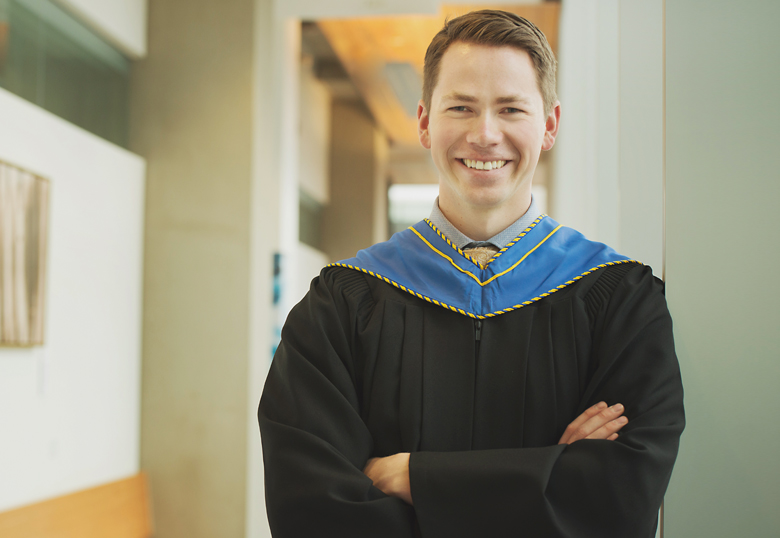When he decided to study at the University of Lethbridge, Douglas Kiss (BSc ’15) wasn’t thinking about its small class sizes or its world-class faculty; he just wanted to be near a lovely young woman he’d recently met. His eventual aim was medical school, and working on an undergraduate degree in neuroscience at the U of L allowed him to pursue both those goals.
“She’s why I chose Lethbridge and it worked out for us,” he says.

The lovely young woman became his wife and he’s now in his first year of medical school at the University of Calgary. He’s also the father of a two-year-old, with another child due in November.
Kiss majored in neuroscience and completed the requirements for a bachelor’s degree in December 2014. He received a BSc (Honours) in 2015, with great distinction. A month later, he started working on a master’s degree, completing the requirements in June this year. At this fall’s convocation ceremonies, Kiss will receive a Master’s of Science degree.
“One of the things I liked the most about the U of L is that it is a smaller school. There was more opportunity to be involved in research in a meaningful way,” he says.
Kiss says he was, as an undergraduate student, able to plan and develop his own research project. He applied for grants, and then conducted the research and analyzed the findings. Often, undergraduate students will work with grad students or post-doctoral fellows on their research topics. Having the chance to manage all the stages involved in conducting research gave him a set of skills he believes helped him get admitted to medical school.
The project he worked on during his master’s degree actually had its start when he was still an undergraduate. It involved implementing a technique called metabolomics, which he used to analyze the small molecules that can be found in blood and urine. He would then look for changes in the amount of small molecules present between healthy and experimental subjects.
“The theory is you can then look at those changes to see what molecular processes are changing with whatever disease you’re studying. It’s really versatile; you can study lots of different things. So far, in our lab we have used it to study stress and concussion,” he says. “Right now in a clinic, most blood and urine tests are focused, meaning you get one answer for one test. The cool thing about this technique is that you get a profile of all the chemicals present at once. You don’t need to run multiple tests. We’re not there yet, but the goal is to essentially combine 30 or 40 different screening tests into one,” he says.
Although the technique has not been fully developed as a diagnostic tool for use in people, it is used in the wine industry and by pharmaceutical companies.
Kiss also worked on a research project that involved using metabolomic analysis in people who had suffered a concussion. The project was the focus of his 3-Minute Thesis (3MT) presentation, for which Kiss won first place.
“The U of L is well known for its strong undergraduate research program,” he says. “I don’t know how common that is elsewhere but I had that opportunity in Lethbridge and it was really great for me.”
The friendliness of being at a small school only became apparent to Kiss after he left. U of L students are competitive but in a constructive rather than a cutthroat way.
“After talking to people here in Calgary who came from other schools, I really liked how much camaraderie there was between the students and how there was a helpful and welcoming attitude. I never felt any of my peers were upset when I did well,” he says.
The small class sizes, sometimes as small as 15 students, gave him the opportunity to know his professors in a way not possible in a larger classroom.
“I felt they were extremely accessible. If I had a question or concern or needed help, I never felt like I was disregarded. I always felt my needs were met,” he says. “Even though Lethbridge is a smaller school, that doesn’t mean it limits your options. You can go pretty much wherever you want with a degree from the U of L. You don’t have to go to a bigger school or an expensive school in the United States to get a good education.”
Kiss moved with his family to Raymond when he was in Grade 6. After graduating from high school in Raymond, he worked and completed a mission with the Church of Jesus Christ of Latter Day Saints. Upon completion of his mission, Kiss wanted to start his post-secondary education and attended Lethbridge College for a year before transferring to the U of L.

